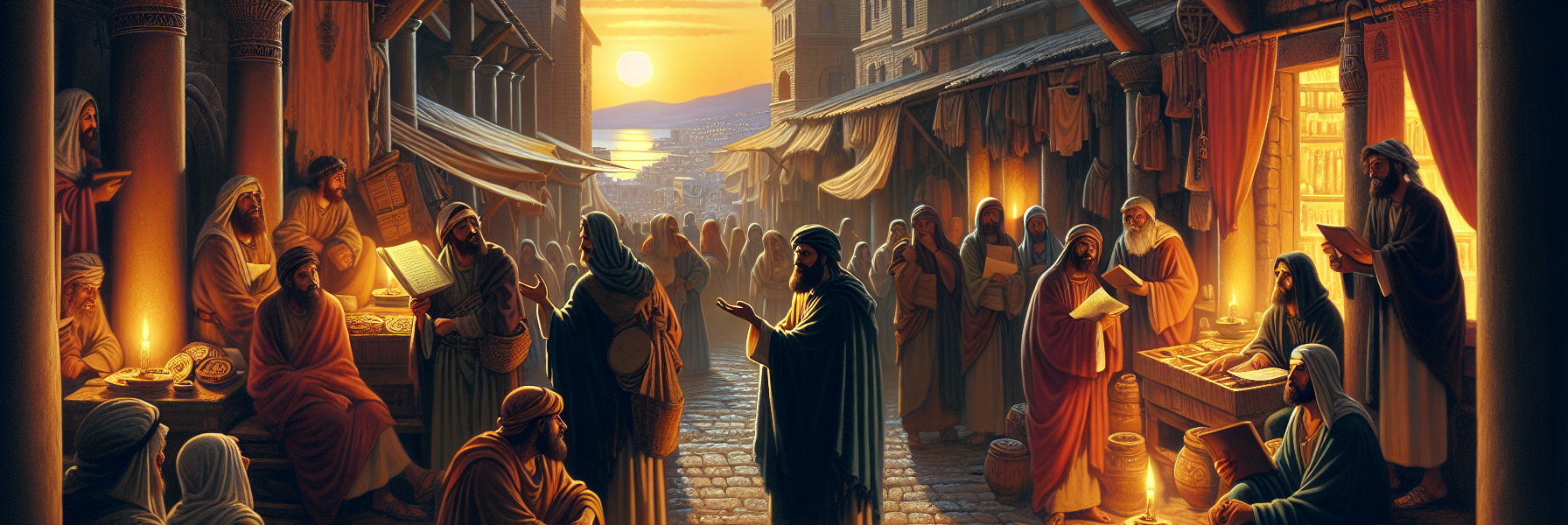**The Warning Against Idleness: A Story of Paul’s Exhortation to the Thessalonians**
The sun hung low over the city of Thessalonica, casting long shadows across the narrow streets where merchants packed their wares and laborers trudged home after a long day’s work. In a small, dimly lit house near the agora, a group of believers had gathered, their faces illuminated by flickering oil lamps as they listened intently to the words of a letter from their beloved teacher, the Apostle Paul.
The messenger, a weary but earnest traveler, unfurled the scroll and began to read in a clear, steady voice:
*”Finally, brothers and sisters, pray for us, that the word of the Lord may speed ahead and be honored, as happened among you, and that we may be delivered from wicked and evil men. For not all have faith.”* (2 Thessalonians 3:1-2)
A murmur of agreement rippled through the room. Many remembered the persecution they had faced when Paul first preached among them—how some had opposed the Gospel with violence and slander. Yet through it all, the Lord had been faithful.
The messenger continued, his tone growing firmer as he reached the heart of Paul’s message:
*”Now we command you, brothers, in the name of our Lord Jesus Christ, that you keep away from any brother who is walking in idleness and not in accord with the tradition that you received from us.”* (2 Thessalonians 3:6)
A heaviness settled over the gathering. Among them were some who had grown lax, neglecting their duties, relying on the generosity of others while refusing to work. They had convinced themselves that since the Lord’s return was imminent, labor was unnecessary. But Paul’s words cut through their complacency like a sharpened blade.
*”For you yourselves know how you ought to imitate us, because we were not idle when we were with you, nor did we eat anyone’s bread without paying for it, but with toil and labor we worked night and day, that we might not be a burden to any of you.”* (2 Thessalonians 3:7-8)
Eyes turned toward a man named Demas, who had been leaning against the wall, his arms crossed. He had been among those who refused to work, insisting that the brethren should provide for him. Now, under the weight of Paul’s rebuke, his face flushed with shame.
The messenger pressed on, his voice unwavering:
*”It was not because we do not have that right, but to give you in ourselves an example to imitate. For even when we were with you, we would give you this command: If anyone is not willing to work, let him not eat.”* (2 Thessalonians 3:9-10)
Gasps filled the room. The command was stern but just. The believers had seen Paul’s example firsthand—how he had labored as a tentmaker, refusing to burden them while he preached the Gospel. His life had been a model of diligence and integrity.
The messenger concluded with a final exhortation:
*”As for you, brothers, do not grow weary in doing good. If anyone does not obey what we say in this letter, take note of that person, and have nothing to do with him, that he may be ashamed. Do not regard him as an enemy, but warn him as a brother.”* (2 Thessalonians 3:13-15)
Silence lingered as the words sank in. Then, one by one, the believers began to speak—some in repentance, others in resolve. Demas, his head bowed, stepped forward.
“I have been wrong,” he confessed. “I will return to my trade tomorrow and no longer live in idleness.”
The others nodded in approval, and the elder of the assembly placed a hand on his shoulder. “We forgive you, brother. Let us walk in love and diligence, as Paul taught us.”
As the meeting ended, the believers departed with renewed purpose, their hearts stirred by the Apostle’s words. The night air was cool, but within them burned a fire of conviction—to live honorably, to work faithfully, and to await the Lord’s return with both hope and diligence.
And so, the church in Thessalonica grew stronger, not only in faith but in discipline, heeding the warning against idleness and embracing the call to steadfast labor—for the glory of God and the good of His people.




